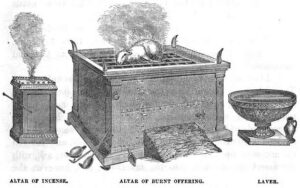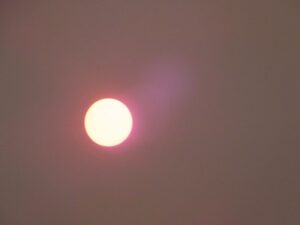Earlier in Revelation chapter five, we read how Jesus, the Lamb of God, took a scroll with seven seals from the right hand of the one who sat upon a celestial throne. Six of those seven seals were opened in Revelation chapter six. The following chapter then unveiled a quartet of angels who restrained four destructive winds until God’s people were numbered and set apart. With the completion of that task, we now turn to chapter eight and the opening of the seventh and final seal…
“When He opened the seventh seal, there was silence in heaven for about half an hour. And I saw the seven angels who stand before God, and to them were given seven trumpets. Then another angel, having a golden censer, came and stood at the altar. He was given much incense, that he should offer it with the prayers of all the saints upon the golden altar which was before the throne.
And the smoke of the incense, with the prayers of the saints, ascended before God from the angel’s hand. Then the angel took the censer, filled it with fire from the altar, and threw it to the earth. And there were noises, thunderings, lightnings, and an earthquake” (Revelation 8:1-5).
Revelation chapter eight opens with a reference to “…silence in heaven for about half an hour” (NIV). So what is the meaning behind this period of silence? Well, this brief period of tranquility may foreshadow the turbulent events to follow, much like a lull that often proceeds a powerful and devastating storm. Once opened, this seal will unleash a horrifying chain of events. The scale of devastation and overwhelming nature of those events will seemingly render these heavenly observers speechless.
This passage continues by saying, “Then I saw the seven angels who stand in the presence of God; seven trumpets were given to them” (CSB). While trumpets are widely recognized for their use as musical instruments, they serve a different function in the context of Revelation chapter eight. In the Biblical era, trumpets were often used as a call to assembly, to signal an announcement, to summon military personnel, or to warn of an emergency condition.
In fact, modern-day societies still use various types of horns to direct our attention to a period of remembrance, an emergency situation, an alert condition, or a call to action. The trumpets we will encounter over the course of Revelation chapters eight, nine, and eleven will function in a similar manner, for they will serve as a summons and a warning.
Image Attribution : Speaker Simple Slash Speaker by Phosphor Icons
“Then another angel, having a golden censer, came and stood at the altar. He was given much incense, that he should offer it with the prayers of all the saints upon the golden altar which was before the throne. And the smoke of the incense, with the prayers of the saints, ascended before God from the angel’s hand” (Revelation 8:3-4).
 Revelation 8:3 draws upon the imagery of an Old Testament-era priest and the sacrificial offerings of that period. For instance, the Biblical book of Leviticus tells us that some of the glowing embers from the altar were carefully transferred to a censer on the Day Of Atonement and combined with fragrant incense for presentation before the Lord (see Leviticus chapter sixteen).
Revelation 8:3 draws upon the imagery of an Old Testament-era priest and the sacrificial offerings of that period. For instance, the Biblical book of Leviticus tells us that some of the glowing embers from the altar were carefully transferred to a censer on the Day Of Atonement and combined with fragrant incense for presentation before the Lord (see Leviticus chapter sixteen).
While the Biblical Scriptures do not provide us with an exact description of a censer, it may have resembled a shovel-like object, a ladle, or a bowl-shaped device with an elongated handle. Since Revelation 5:8 earlier referenced “bowls” of incense, some form of that shape seems most likely. But more significant is the fact that this incense was offered “…with the prayers of all the saints.” Once again, this divine association of human prayer with the pleasing aroma of fragrant incense should encourage us to commune with God in prayer.
However, this reverent scene was about to change dramatically…
“Then the angel took the censer, filled it with fire from the altar, and threw it to the earth. And there were noises, thunderings, lightnings, and an earthquake. So the seven angels who had the seven trumpets prepared themselves to sound. The first angel sounded: And hail and fire followed, mingled with blood, and they were thrown to the earth. And a third of the trees were burned up, and all green grass was burned up” (Revelation 8:5-7).
In the original language of this passage, the phrase “burned up” conveys the image of something that has been burned to the ground or wholly consumed. (1) The prospect of one-third of our planet’s surface being destroyed in such a manner is difficult to fully grasp. For instance, consider the devastation that would be wrought by the incineration of the world’s pasture lands and one third of all trees. That figure might also encompass one third of the rice, wheat, and other grains that feed much of the world’s population.
The scope of such destruction is almost too terrible to contemplate. Finally, there is a reference to hail and fire mixed with blood. Whatever the precise meaning of that phrase, it is certain to be highly destructive as well.
Image Attribution : illustrators of the 1890 Holman Bible, Public domain, via Wikimedia Commons
(1) G2618 – katakaio – Strong’s Greek Lexicon (kjv). (n.d.). Blue Letter Bible. https://www.blueletterbible.org/lexicon/g2618/kjv/tr/0-1/
“Then the second angel sounded: And something like a great mountain burning with fire was thrown into the sea, and a third of the sea became blood. And a third of the living creatures in the sea died, and a third of the ships were destroyed” (Revelation 8:8-9).
The first global judgment of Revelation chapter eight affected the grass and trees. That was followed by a similar judgment upon the seas here in verses eight and nine. This catastrophic event was precipitated by “…what appeared to be a huge burning mountain [that] was thrown into the sea” (TLB). From a 21st century perspective, this appears to describe a meteorite or other stellar object entering the earth’s atmosphere prior to impact in one of the world’s oceans.
That event prompted the destruction of “…a third of the living creatures in the sea” (Revelation 8:9 NIV). Much like the previous judgment, the loss of one-third of the earth’s marine life would have a catastrophic effect on the food chain that sustains humanity. From the rancid odor of decaying fish to the collapse of various marine ecosystems, this act of judgment will bring an unprecedented level of devastation.
We should also note that one-third of all seafaring ships were destroyed in this event. With an untold number of sailing vessels throughout the globe, along with their passengers and crew, the human toll associated with this event will be immeasurable. That excludes the financial loss of any cargo that may have been aboard those vessels.
“Then the third angel sounded: And a great star fell from heaven, burning like a torch, and it fell on a third of the rivers and on the springs of water. The name of the star is Wormwood. A third of the waters became wormwood, and many men died from the water, because it was made bitter” (Revelation 8:10-11).
Verses ten to eleven describe another object falling from the sky. However, our author depicts this second item as “as great star” that was “burning like a torch.” This object thus appears to be less substantial than the one that resembled a “huge burning mountain.” Nevertheless, that was enough to poison one-third of the earth’s freshwater supply.
 Verse eleven also adds some additional detail: “The name of the star is Wormwood.” Wormwood is a type of plant that is described by one commentator in the following manner…
Verse eleven also adds some additional detail: “The name of the star is Wormwood.” Wormwood is a type of plant that is described by one commentator in the following manner…
“Many species of wormwood (a woody herb) grow in Palestine, and all have a strong, bitter (but not poisonous) taste, which causes the plant to be used as a symbol of bitterness, sorrow, and calamity. This plague will make a third part of the fresh water supply of the earth unfit for human consumption.” (1)
Image Attribution: Hermann Adolf Köhler (1834 – 1879), Public domain, via Wikimedia Commons
(1) Ryrie, C. C. (1995). The Ryrie Study Bible. Note on Revelation 8:11
“Then the fourth angel sounded: And a third of the sun was struck, a third of the moon, and a third of the stars, so that a third of them were darkened. A third of the day did not shine, and likewise the night. And I looked, and I heard an angel flying through the midst of heaven, saying with a loud voice, ‘Woe, woe, woe to the inhabitants of the earth, because of the remaining blasts of the trumpet of the three angels who are about to sound!’” (Revelation 8:12-13).
 In addition to the losses described in the previous verses of Revelation chapter eight, this passage tells us that there will be a thirty-three percent reduction in natural light. Whatever the cause, this will undoubtedly lead to negative changes in the areas of global meteorology, temperature, and agriculture, among others.
In addition to the losses described in the previous verses of Revelation chapter eight, this passage tells us that there will be a thirty-three percent reduction in natural light. Whatever the cause, this will undoubtedly lead to negative changes in the areas of global meteorology, temperature, and agriculture, among others.
So now that we have reached the final verse of Revelation chapter eight, it may be helpful to perform a brief assessment. First, let’s consider the impact of these judgments upon humanity. Thus far, we have witnessed the loss of the earth’s grass surfaces, as well as a thirty-three percent reduction in the planet’s tree cover, marine life, seafaring vessels, freshwater supply, and natural light. It’s hard to imagine anything that could be worse than that.
Yet, the final verse of this chapter closes with an ominous statement: “…’Woe! Woe! Woe to those who live on the earth, because of the remaining trumpet blasts that the three angels are about to sound!’” (HCSB). While the judgments of Revelation chapter eight have been restricted to the natural realm, that will change as we enter Revelation chapter nine.
In the following chapter, we will encounter destructive spiritual forces that are far worse than anything we’ve seen to this point. In contrast to a video game or horror movie where gamers and viewers can easily leave the terrors of a virtual world, those who are alive during this period will face a succession of menacing, real-life, living nightmares.
But for now, Revelation chapter eight reminds us that God has blessed us with a variety of gifts that we may sometimes take for granted. For instance, what if our water was too polluted to drink? What if each day brought thirty-three percent less sunlight? What if a large percentage of the grass and trees in our neighborhoods were suddenly incinerated? What if farmers and ranchers produced one-third less food?
These essential elements of life, such as fresh air, sunshine, food to eat, and clean water, are blessings we shouldn’t take for granted. As we reflect upon these things and the ease with which they might vanish, we should grow in our sense of gratitude for the God who graciously blesses us.
Image Attribution :Smoke-darkened Sun, CC BY-NC 2.0, Linda in Fortuna, via flickr.com, disclaimer notice


